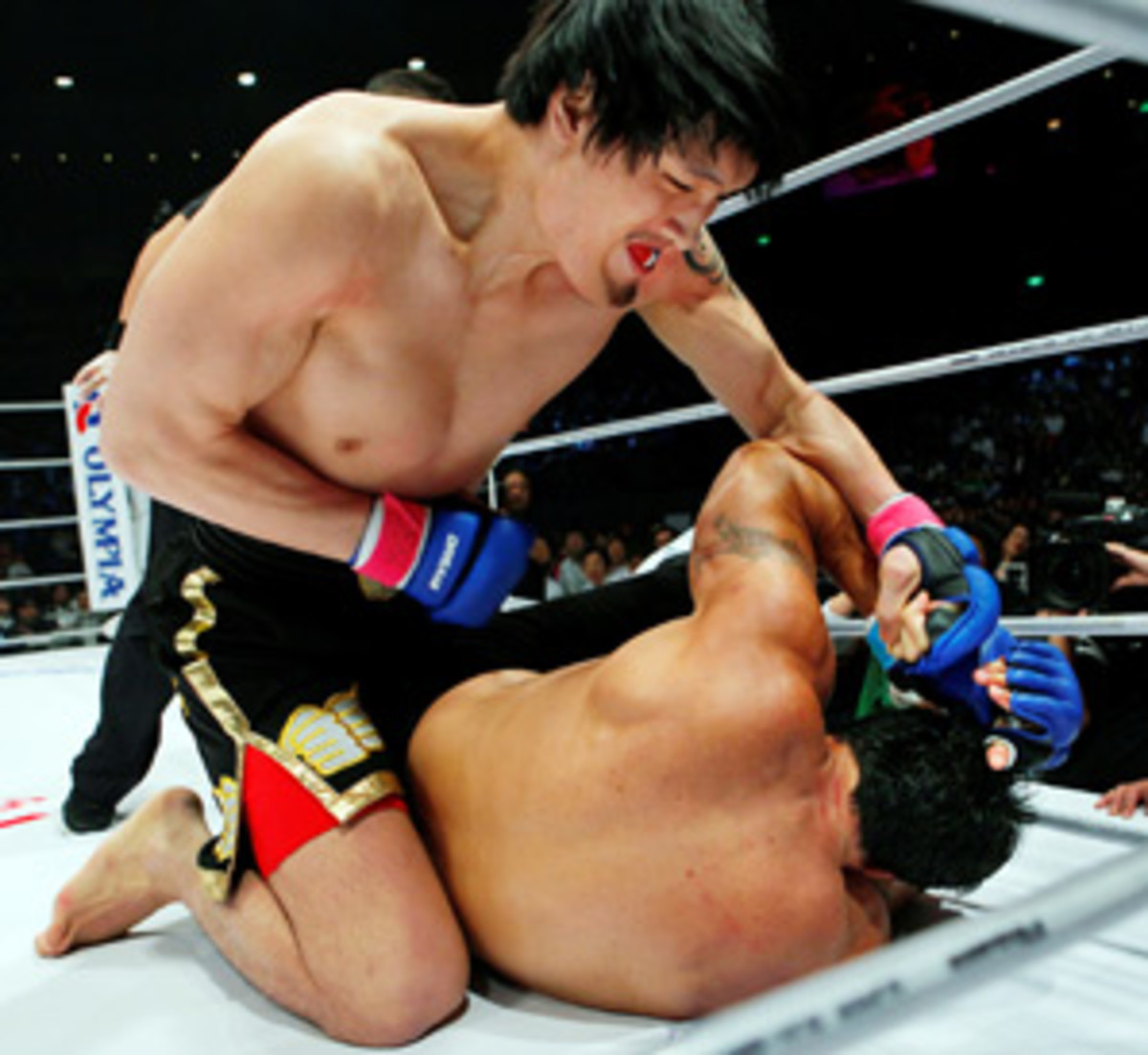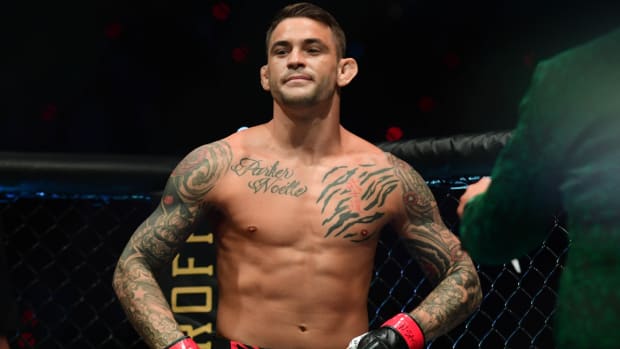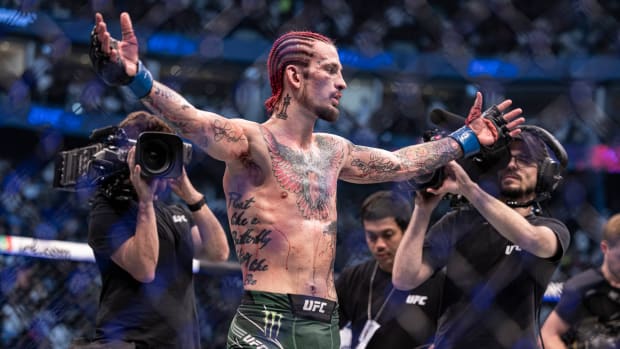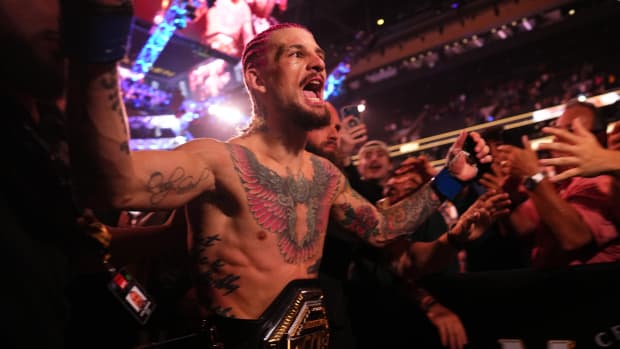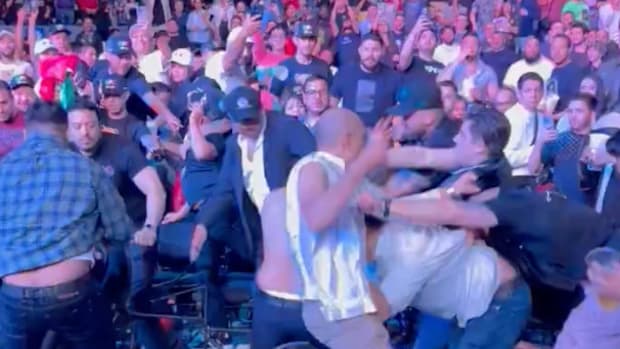MMA in Japan: sport or spoof?
There's no logic behind mixed martial arts events like last Tuesday's Dream 9 in Japan. None.
On the same night and in the same ring the former Major League slugger JoseCanseco made his MMA debut against an experienced Korean kickboxer (who's built like an out-of-season Shaquille O'Neal), former Olympic wrestling hopefuls and world-class mixed martial artists fought spirited campaigns in front of an appreciative audience.
Nowhere is the schism between what casual and diehard audiences expect from MMA clearer than Japan. And nowhere do promoters and TV networks more willingly capitalize on that rift.
At its highest levels in Japan, MMA appears to serve one purpose: a vehicle to deliver numbers for networks, paltry as they may be compared to the boffo ratings that nearly made it a household sport a half decade ago.
Failed promotions, bitter political rivalries and the rise of MMA in North America all helped tamp down MMA's relevance -- and ratings -- in Japan.
Still, the sport exists -- though where it's headed and what it will look like isn't necessarily clear.
In March 2007, Ultimate Fighting Championship's owners acquired Japan's Pride Fighting Championships in what was hailed as the deal that would bring together two halves of a fractured sport. Yet, 27 months after the deal went through, it's difficult to say what, if anything, was achieved save the sense that mixed martial arts faces uncertain times where it once flourished.
Though there's an argument to be made that Japanese MMA remains healthy based on its proliferation, dwindling television opportunities, dropping purses and an unsteady morale among the country's fighters paint a different picture.
With a brewing rivalry between Pride's parent company, Dream Stage Entertainment, and K-1 backer, Fight Entertainment Group -- a sort of mutually beneficial cold war between promotional companies -- MMA in Japan was elevated in stature following the turn of the millennium.
When the playing field shifted after Pride folded following allegations of ties to organized crime, promotional rivals found themselves working together. Just how successfully, though, is a matter of interpretation.
That combined effort rendered Dream, which has the look of Pride but lacks its soul. Said one Japanese fighter manager, who asked not to be identified: rather than "concentrating on getting the sport back to where it used to be," these factions spend their energies on an ongoing "war between K-1 and Pride."
More complicated are the struggles of FEG's operators. K-1 mastermind Kazuyoshi Ishii, released from prison in 2008 after serving more than a year for tax evasion, is rumored to be dueling against FEG president SadaharuTanigawa for control of the company Ishii founded in 1993.
From the top down, the whole of Japanese MMA is malignant with this kind of strife, and has been for some time.
"Right now Japanese MMA is at a stalemate," said FEG's Mike Kogan, who resides in the U.S. and handles scouting for much of the group's foreign talent. Yet, he said, even if TV ratings aren't "high, they're steady, which shows there's a fan base for MMA in Japan. They're just waiting to see what happens. Some stars need to breakthrough and be created."
Ratings on Tokyo Broadcasting System for Dream 9 and its oversized tournament that featured, among others, Bob Sapp -- a 6-foot-4, nearly 400-pound NFL washout -- were up. (But not because of Sapp. Or Canseco and his 77-second knockout loss to Hong-Man Choi.) A battle at 139 pounds between Norifumi "Kid" Yamamoto and American Joe Warren was the highest-rated bout last Tuesday, which, according to promoters, was, welcome news for fans hoping Japanese MMA remains more sport than spoof.
Hoping to emerge as a challenger to Dream, Sengoku promoter World Victory Road sees itself as the other half of a rivalry that could energize fans like when K-1 and DSE feuded.
Half-empty arenas and weak TV presence don't bode well. But solid backing, sponsorship and Monday's signing of 2008 Olympic judo gold medalist and potential crossover star Satoshi Ishii, make Sengoku an attractive destination for some young American fighters, such as Olympic wrestling hopeful MoLawal. (Better money, non-exclusive contracts, a busy fight calendar and the reverence that accompanies strong amateur credentials make 11-hour flights worth the effort, Lawal said.)
Months following Nobuyuki Sakakibara's sale of Pride to the UFC, the American MMA juggernaut filed suit because it said he and his subsidiaries failed to live up to the terms of their agreement. Sakakibara countersued, and depositions are expected to commence this month in Las Vegas.
Sakakibara has hinted at returning to MMA, and now some are suggesting he'll make a play at regaining control of the Pride brand. Whether or not that happens, a close associate to Sakakibara said the former Pride boss has designs on putting money into the Japanese MMA market once business with Zuffa is settled. Of course, with the up-and-down nature of MMA in Japan, this would only make sense.
